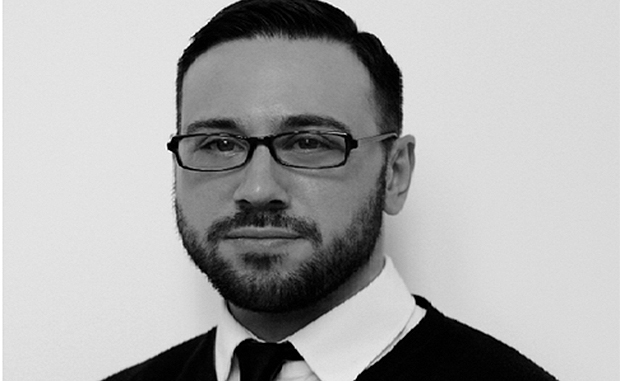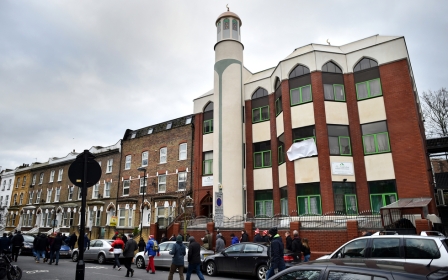Meet the British Muslim who wants to lead an Islamic reformation

When Adam Deen agreed to join the Quilliam Foundation in November 2015 it caused a stir among politically engaged British Muslims.
By becoming Quilliam's head of outreach, Deen is now a key member of staff at the world's first self-styled counter-extremism think tank.
And in the same vein as Quilliam’s founder Maajid Nawaz, Deen’s personal journey as a Muslim is seen as one of extremist activist turned counter-extremist campaigner.
Deen joined al-Muhajiroun while studying at Westminster University in 1995 and would stand on street corners denouncing non-Muslims to hell and accusing fellow Muslims of being sell-outs.
He supported the group’s call to establish a global Islamic state but he left al-Muhajiroun in 2003 - two years before the group was banned for links to violence - after a former member encouraged him to seek out a different understanding of Islam.
Nearly a decade later in 2012, he established the Deen Institute, a Muslim debating forum named after the Arabic word for religion, which aimed to promote critical thinking among British Muslims that would reflect his own journey away from extremism.
In joining Quilliam Deen has moved on to work at an organisation which has sought to place itself at the forefront of the debate around Islamic extremism since its founding in 2008, during which time it has often courted criticism for its perceived closeness to British government counter-terrorism policy.
Deen, who is from London and has Turkish parents, joined Quilliam after months of negotiations with its leadership, and despite holding reservations about the organisation’s past actions, he concluded that it has an “honourable premise” which is to challenge ideas he believes have hijacked Islam.
Nearly six months on from joining Quilliam, Deen sat down with Middle East Eye at a coffee shop in Russell Square, to discuss his opinions on problems impacting British Muslims and to outline his vision for a reformed understanding of Islam.
Throughout the 90 minute discussion Deen passionately warned of grave problems facing British Muslims, most of which are rooted in what he views as a puritanical understanding of Islam. He believes the religion has become “divorced from ethics” and while he is proud of being a Muslim he feels disconnected from his community.
“Confucius said he loves humanity but hates people. If I could borrow from his sentiments I love Islam, but I have a big problem with Muslims,” he said.
“Most Muslims are good people, most Muslims are helping their neighbour. I’m talking about those voices – the self-proclaimed vanguards of our faith – as being the ones with a problem.”
Islamic State is Islamic
Deen, smartly dressed wearing a shirt and tie, was fidgety and constantly gesticulating as we spoke about issues that are clearly close to his heart.
He immediately pointed to the Islamic State (IS) group as being the crux of his argument when explaining what he believes to be a major crisis in Islam.
“ISIS is a blessing in disguise,” he said, using an alternative acronym for the Syria-Iraq based militant group.
Since IS seized control of Iraq’s second city of Mosul in June 2014 the group has dominated the global news agenda. From beheading Western hostages to burning alive a Jordanian pilot, the group’s carving out of a self-declared caliphate between Iraq and Syria has shocked the world.
“For a long time these noxious ideas were shielded within our medieval texts. But what ISIS has done is to take those ideas and actualise them in the world, allowing us to see the horrific outcomes,” claimed Deen.
While many people including British Prime Minister David Cameron have sought to distance IS from Islam as a religion, Deen says this approach is poorly informed.
“We can’t say they aren’t Islamic,” he argued. “If being Islamic means our texts – interpretation of the Quran and accepting the Hadith tradition in its entirety (the sayings and teachings of the Prophet Mohammed), and classical scholarship – then they (IS) are grounded within Islamic tradition.”
Deen said that he sees the religious roots of IS as being inextricably linked to Wahhabism, which is a term used to describe the ultra-conservative brand of Islam practiced in Saudi Arabia.
IS and Saudi Arabia have regularly been compared in their practices and a leading Saudi cleric has said IS “follows the same thought” as the Gulf state. However Saudi officials deny the parallels and have repeatedly said they are playing a strong role in fighting IS, which has condemned the ruling family and has carried out a series of deadly attacks in the kingdom over the past 18 months.
Riyadh has been credited with spending billions of dollars disseminating its state-supported religious doctrine by funding mosques around the world, and Deen said this has been “extremely problematic” for Britain, where he says its teachings have been widely spread through schools and Islamic societies.
“By definition Wahhabism is schismatic,” he said, meaning it emphasises divisions between Muslims, such as the Sunni-Shia divide. “It’s a rejectionist view of Islam. They define Islam by what it is not and whitewash our religion’s rich history of debate.”
One of the consequences of Wahhabism, according to Deen, is takfirism, a term used to describe the practice of a Muslim accusing another Muslim of leaving the faith, which is commonly known as apostasy.
In groups such as IS, and in countries including Saudi Arabia, apostasy can be punished with the death penalty.
Deen used an analogy of how he believes Islamic theology can be used to justify the killing of apostates, something he says no one would normally accept.
He argued that the killing of apostates is justified by scholars who use hadiths supporting the practice, which he said exposed a “lack of critical thinking” among Muslims who accept the justification.
“It’s very easy to convince someone that it is acceptable to kill someone for changing their faith,” he said. “Suddenly a hadith appears. You say the Prophet said this. They think ‘is that a real Hadith?’ You answer ‘absolutely, it’s a real Hadith’. They ask ‘is it accepted by the four schools of thought?’ You answer ‘yes it is’. They conclude ‘it must be true then’.”
Deen said that this "Wahhabist approach is the enemy within Islam” and must be challenged.
Challenge extremism on university campuses
At Quilliam Deen said he believes he has the perfect vehicle to campaign for his vision of a reformed understanding of Islam, and he said his advocacy will focus on university campuses.
Deen said that the “majority of Islamic societies at universities are influenced by Wahhabist thinking”.
He argued that his own radicalisation took place while studying at Westminster University, the same university attended by notorious IS executioner Mohammed Emwazi, who was known as “Jihadi John” prior to his killing by a British drone strike in Syria in November 2015.
“Mosques don’t radicalise or produce extremists,” he said. “A mosque is what I call a spiritual dumping ground. You go there, you do your prayers, and then you leave. Young people’s ideas are moulded during their university years.”
Deen said he wants to see more diversity in Islamic speakers who are invited to speak at universities, as he believes the majority of platforms are currently dominated by Wahhabist-leaning activists.
However, Deen knows Quilliam may not be welcomed by many Islamic societies who think his new organisation ignores the impact of British foreign policy – principally the wars in Iraq and Afghanistan – as a factor motivating people to join groups such as IS.
Deen said this is a “caricature” of Quilliam’s position, and he acknowledged the complexity of extremism, but he insisted that ideology is the main driver of recruitment for IS.
“Look, there are many factors involved in radicalisation. There are political, economic, and social. However, to focus on them at the exclusion of ideology is absurd.
“Ideology has a profound effect because ideology can function in creating extremism without those other factors. That’s our (Quilliam’s) nuanced position.”
First step is to 'accept there is a problem in Islam'
Deen’s strident belief that ideology is the root cause of extremism led him back to an argument about what he views as a problem within Islamic theology and its relationship with ethics.
“There’s a major crisis in our theology that supports the view that our ethics are only derived from the Quran and Hadith. That’s a major problem because what that means is Muslims in society operate outside of the ethical sphere.”
Deen’s own position on ethics in Islam is that the right to sin is inalienable - and it is this principle, which he said is easily found in Islamic history, that should form a reformed practice of Islam.
“Islam holds onto the liberal principle that the right supersedes the good. This means that even though I may have a conception of what it is to be good, that is outweighed by the right to live the way you want to live – so long as you don’t harm someone.
“This is the problem with Islamism. They say that the principle of the good supersedes the value of the right. This leads to a totalitarian and authoritarian religion.”
Deen said he understands that his perception of Islam is not one that is commonly held among British Muslims, which for him is the root of the problem that he wants to fix.
The first step to a solution, he said, is for Muslims to “accept there is a problem in Islam”.
“When I say Islam I don’t mean the ontological mind of God. I mean in how we understand our texts, our scholarly tradition, and our tradition.”
He argued that the response of British Muslims to certain events in the UK have displayed a worrying level of “moral bankruptcy” and he pointed to his own experience as evidence.
In April 2014 Deen was part of a group of British Muslims who released a video of themselves dancing and singing along to Pharrell Williams’ song Happy. The video received over two million views, and while it was received positively for the most part, it stirred online debate with critics labelling it as sinful.
Deen said he was abused on social media for taking part in the video, and he claimed that the negative response from those British Muslims who condemned the “Happy” video far outweighed their outrage over other events, such as the killing of British soldier Lee Rigby a year earlier in May 2013.
Rigby was stabbed to death in London by two British Muslims, one of whom was Michael Adebolajo – who attended demonstrations organised by Deen’s former group al-Muhajiroun. Deen said British Muslims have a responsibility to speak out against any violent or extremist acts that are done in the name of Islam.
Criticism of Quilliam's approach
Deen said he is aware that his approach antagonises his opponents and now that he works with Quilliam he said he is also aware that his new organisation antagonises a lot of British Muslims.
Quilliam has been widely criticised for supporting and contributing to the government’s counter-terrorism policy Prevent, which many British Muslims view as unfairly targeting them.
Stories including schoolchildren being referred to Prevent over their support for Palestine have gone viral, leading to British Muslim community groups denouncing the policy and calling for it to be scrapped.
Although Quilliam has not received public funding since 2011, the organisation continues to be viewed by its critics as a mouthpiece for the government, largely out of its support for Prevent and involvement in doing training for the policy in schools across Britain.
Deen, who trains teachers to spot signs of radicalisation, is keen to defend Prevent, and said that negative stories about the policy doesn’t mean it should be scrapped, but rather that British Muslims should engage to improve it.
“Let us not define Prevent by anomalies. Prevent is a work in progress – at the moment there is a training gap and teachers need to have access to better resources so the policy can be more effective.”
Quilliam has also been criticised over its campaigning for reform of Islam at a time when Islamophobic attacks have risen significantly, an approach which Quilliam’s opponents have called victim blaming.
While Deen acknowledged that Islamophobia is a problem, he argued that it should not dominate the narrative around British Muslims, because he says this “blinds us to the problems we have”.
“Britain is one of the most tolerant countries in the world and we need to stop having this chip on our shoulder. We are becoming insular and non-reflective because we keep being told we are victims.”
His said his aim is not to win “converts to Quilliam” but rather to target a “silent majority” of British Muslims and encourage them to “challenge what they have been told to believe”.
“We are appealing to the middle ground – the silent majority. The middle ground are very receptive to our message.”
Deen said he is enjoying the work at Quilliam and explained that his challenge is to change the narrative among British Muslims and promote his self-styled vision for a more tolerant and progressive understanding of Islam.
His message to Quilliam’s opponents is clear: they should engage him in debate and challenge his views in public.
“People have to understand we are not going away. I’m all up for debating. I want to engage with people. If you are sincere that my view is Islamically incoherent then come and engage and discuss with me.”
New MEE newsletter: Jerusalem Dispatch
Sign up to get the latest insights and analysis on Israel-Palestine, alongside Turkey Unpacked and other MEE newsletters
Middle East Eye delivers independent and unrivalled coverage and analysis of the Middle East, North Africa and beyond. To learn more about republishing this content and the associated fees, please fill out this form. More about MEE can be found here.




